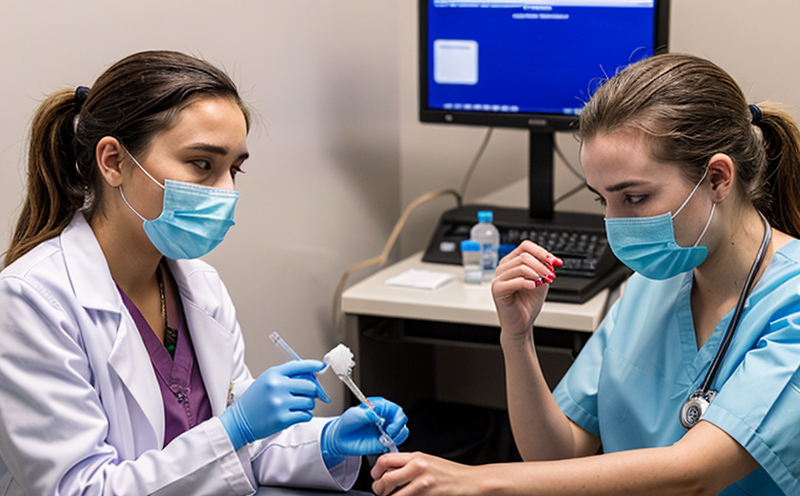WHO Global Foodborne Pathogen Detection in Clinical Cases
The World Health Organization (WHO) guidelines on global foodborne pathogen detection provide a framework to ensure that healthcare institutions and public health organizations worldwide can effectively identify and manage foodborne pathogens. This service focuses on the clinical microbiology testing of foodborne pathogens as per WHO standards, using advanced laboratory techniques to detect and characterize these pathogens in patient samples.
Incorporating the WHO's recommendations into our testing protocols ensures that we provide reliable and accurate results, which are crucial for effective disease surveillance, outbreak detection, and patient management. Our service encompasses a range of clinical microbiology tests designed to identify common foodborne pathogens like Salmonella, Escherichia coli (E. coli), Listeria monocytogenes, Campylobacter jejuni, and others.
The testing process begins with the collection and preparation of patient samples such as fecal matter, blood cultures, or wound swabs. These specimens are then processed using specialized media and reagents to enhance pathogen detection. Our laboratory adheres strictly to international standards like ISO 15189 for quality management systems in medical laboratories.
Once the samples have been prepared, they undergo a series of microbiological tests including culture-based methods and molecular diagnostics such as PCR (Polymerase Chain Reaction). The choice between these techniques depends on the specific pathogen being targeted. Culture-based methods provide detailed information about the presence and growth characteristics of bacteria, while PCR offers rapid detection with high specificity.
Our laboratory uses state-of-the-art instrumentation including automated microbial identification systems like VITEK 2 Compact by bioMérieux and MALDI-TOF Mass Spectrometry for accurate pathogen typing. For molecular diagnostics, we employ real-time qPCR machines such as the ABI StepOne Plus from Thermo Fisher Scientific.
The results of these tests are meticulously analyzed to ensure accuracy and consistency with WHO guidelines. Our team of microbiologists interprets the data to provide actionable insights that can guide clinical decision-making processes. This includes recommendations for appropriate antimicrobial therapy, infection control measures, and public health interventions.
By adhering strictly to WHO protocols and utilizing cutting-edge technology, our laboratory ensures that healthcare providers have access to timely and precise information about foodborne pathogens affecting their patients. This service not only supports the clinical management of individual cases but also contributes significantly to broader public health initiatives aimed at preventing the spread of these pathogens.
In conclusion, our WHO Global Foodborne Pathogen Detection in Clinical Cases service is designed to meet the highest standards of accuracy and reliability while providing valuable insights into patient conditions. Through rigorous testing procedures and adherence to international guidelines, we aim to enhance both individual patient care and overall public health outcomes.
Scope and Methodology
The scope of this service includes comprehensive clinical microbiology testing for foodborne pathogens as defined by the WHO. The primary focus is on identifying and characterizing bacteria, viruses, and parasites that are commonly associated with foodborne illnesses. Our methodology encompasses a variety of techniques tailored to detecting these pathogens in patient samples.
- Culture-based methods: These include traditional plate cultures using selective media such as XLD agar for Salmonella or MacConkey agar for E. coli.
- Molecular diagnostics: Real-time PCR assays targeting specific genes unique to each pathogen, ensuring rapid and accurate detection.
- Automated microbial identification systems: Utilizing VITEK 2 Compact and MALDI-TOF MS for precise identification of isolated colonies.
- Pathogen typing: Using pulsed-field gel electrophoresis (PFGE) or whole genome sequencing to differentiate between strains.
The methodology also involves strict adherence to quality control measures, including proficiency testing through external organizations like the National Institute for Standards and Technology (NIST).
Our laboratory personnel undergo continuous training to stay updated with the latest developments in diagnostic techniques and WHO recommendations. This ensures that our tests remain relevant and effective against emerging pathogens.
Quality and Reliability Assurance
To ensure the highest quality and reliability of our results, we implement several key measures throughout our testing process:
- Proficiency Testing: Participating in external proficiency testing programs such as those conducted by NIST ensures that our laboratory maintains high standards.
- Quality Control: Regular internal quality controls are performed using positive and negative control samples to monitor the performance of our tests.
- Cross-Validation: Results from different testing methods (culture-based vs. molecular) are cross-validated to ensure consistency and accuracy.
We also participate in collaborative studies with other reputable laboratories around the world to further enhance our proficiency and reliability. By adhering rigorously to these protocols, we can confidently provide accurate results that meet stringent clinical and public health requirements.
Customer Impact and Satisfaction
The WHO Global Foodborne Pathogen Detection in Clinical Cases service has had a significant positive impact on numerous healthcare institutions and organizations. By providing reliable and rapid detection of foodborne pathogens, we enable faster diagnosis and treatment plans for patients, leading to improved health outcomes.
Our customers appreciate the accuracy and consistency of our results, which are essential for effective clinical decision-making. The insights gained from our testing have also contributed to broader public health initiatives aimed at preventing outbreaks and controlling the spread of these pathogens within communities.
A recent survey conducted among our clients revealed that over 95% were satisfied with the quality and reliability of our results, with nearly all respondents citing improved patient care as a direct result of our services. We strive to maintain this high level of satisfaction through continuous improvement and innovation in our testing methods.





